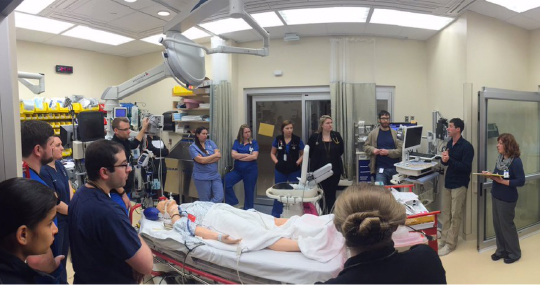|  | |
 |
|  | | Interdisciplinary simulation in the cardiac ICU at EUH Midtown | Growing team practice | In one of Aesop's Fables, different parts of the body go on strike to protest doing all the work while the stomach gets all the food. The hands refuse to take up food, and the mouth and teeth are left with nothing to do. The arms and legs grow weak, and the body dies.
Doug Ander, assistant dean for medical education, used the age-old story to make a point in his lecture to first-year health professions students on Interprofessional Team Training Day on September 17.
"The moral of the story is why you are here today," he told them. "You are training in different disciplines, clinics, and parts of the world. What it comes down to, whether you are taking care of a patient or a community, is working together and having respect for each other in your different roles. Otherwise, your patient or community may die."
This year's team training day came on the heels of the first-ever symposium hosted by the Woodruff Health Educators Academy (WHEA). Held September 12, the symposium drew 135 participants eager to learn how Emory can support and expand interprofessional education and collaborative practice.
The team training day was among the initiatives highlighted. As symposium panelist Beth Davis noted, team training has expanded since it began in 2007. Originally an exercise for medical and nursing students, it now also includes students in public health and in the physician assistant, physical therapist, anesthesia assistant, and genetic counseling programs.
This fall, public health students participated for the first time, raising total attendance from 500 to 1,200 students. The presence of public health students at team training day illustrates the growing importance of interprofessional education, both at Emory and nationwide.
"Interprofessional education is now part of the accreditation criteria for schools of public health, as it is for other schools in the health field," said Davis, assistant professor of rehabilitation medicine and a team training day planning committee member.
The curriculum for team training day is based on TeamSTEPPS, a training protocol that helps schools and programs meet standards set by the Interprofessional Education Collaborative (IPEC).
Deborah Trautman, president and CEO of the American Association of Colleges of Nursing (AACN), explained IPEC's purpose in her keynote address at the WHEA symposium. AACN is a member of IPEC, and Trautman serves as IPEC's secretary and treasurer.
"IPEC helps us looks at the similarities and differences in our health professions so that we can align our core competencies and speak with one voice," Trautman said. "Despite our best intentions, we still practice very much in silos. We are all facing important struggles in population health, an aging population, and a shortage of providers. We need to think how to maximize our skills."
"The future is not about what we know but how we think creatively and how we interact with others."
Teamwork is definitely paramount for Vanessa Moll, another WHEA symposium panelist, who runs workplace simulations in the cardiothoracic ICU at Emory University Hospital Midtown.
Using Hal, the medical school's simulation mannequin, she puts a team of nurses, respiratory therapists, residents, pharmacists, and others through their paces. As they practice, each patient scenario becomes more elaborate. During one exercise, she said, Hal went into hemorrhagic shock. The team didn't identify the bleeding in time, and their patient died. Team members were crushed.
"We talked over the scenario, and I gave the team a chance to do better," said Moll, assistant professor of anesthesiology. "That's important. The scenario became so real that the team took a hit when things didn't go well."
In her presentation, Moll showed a photo of the Hamburg Symphony Orchestra in its new concert hall in her native Germany. "That's what I want my team to look like," she said. "Everybody is an expert, but only when you combine skills do you have a symphony. That's what we are striving for."--Pam Auchmutey | |
| |
|

